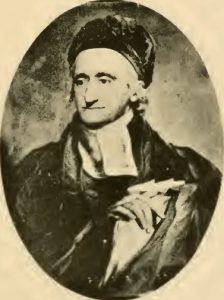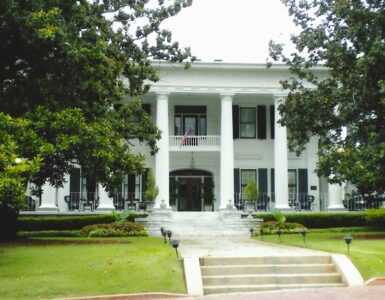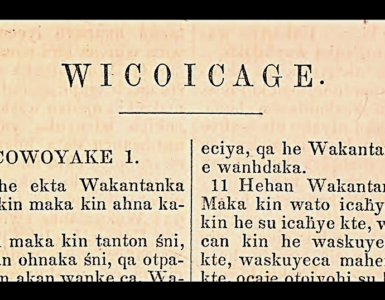 The following transcription is a letter published with the extracts of the minutes for the General Assembly of the Presbyterian Church in the United States of America for its third meeting in 1791. The Assembly was held in Second Church, Philadelphia, with John Woodhull the moderator (pictured). It was intended to provide guidance and encouragement for the denomination concerning their ministries not only in existing congregations but also for the funding of missionaries to the frontier. The frontier or west of the time included what are currently the states of Ohio, western Pennsylvania and New York, and Tennessee, Mississippi, Kentucky, and Alabama. With the Louisiana Purchase coming in 1803 the geographic mission field would grow by over 800,000 square miles. There is even a hint of what would later be called manifest destiny as the Presbyterians anticipated that “our holy religion will extend its influence over the vast regions of this western continent, and songs of salvation be heard from its remotest corners.” The letter shows optimism for the future work of the church as the new nation enjoys its national independence while frontiersmen, settlers, and missionaries pressed west for opportunities. The Presbyterians would expand their ministry in conjunction with the geographic growth of the United States, but optimism for missions was tempered by the importance of the settled churches getting their own houses in order by maintaining means of grace worship, promoting proper piety, and having dedicated ministers. Even though the area of the United States is currently complete, the instructions in the letter about how missions and ministry are accomplished have abiding value.
The following transcription is a letter published with the extracts of the minutes for the General Assembly of the Presbyterian Church in the United States of America for its third meeting in 1791. The Assembly was held in Second Church, Philadelphia, with John Woodhull the moderator (pictured). It was intended to provide guidance and encouragement for the denomination concerning their ministries not only in existing congregations but also for the funding of missionaries to the frontier. The frontier or west of the time included what are currently the states of Ohio, western Pennsylvania and New York, and Tennessee, Mississippi, Kentucky, and Alabama. With the Louisiana Purchase coming in 1803 the geographic mission field would grow by over 800,000 square miles. There is even a hint of what would later be called manifest destiny as the Presbyterians anticipated that “our holy religion will extend its influence over the vast regions of this western continent, and songs of salvation be heard from its remotest corners.” The letter shows optimism for the future work of the church as the new nation enjoys its national independence while frontiersmen, settlers, and missionaries pressed west for opportunities. The Presbyterians would expand their ministry in conjunction with the geographic growth of the United States, but optimism for missions was tempered by the importance of the settled churches getting their own houses in order by maintaining means of grace worship, promoting proper piety, and having dedicated ministers. Even though the area of the United States is currently complete, the instructions in the letter about how missions and ministry are accomplished have abiding value.
Please visit the Presbyterians of the Past homepage and see the topical selections included in the recently updated “Notes & News” collection. Older entries no longer available on the homepage can be accessed in the “Notes & News Archive.”
Barry Waugh
The General Assembly of the Presbyterian Church in the United States [of America], to the Churches under their care.
Dear Friends and Brethren—
By the blessing of a gracious providence, the churches of our communion in America, which were originally few and inconsiderable, have multiplied with a rapid increase, are spread over a wide extent of country, and become respectable as a religious society. But while we recollect with grateful hearts, the indulgent care of the great Head of the church, in granting us such favors, it is our duty to attempt to secure and improve them. He that hath promised to be with his church to the end of the world, and whose faithfulness cheers his people in the most trying scenes, has enjoined it upon them to be active and industrious in the use of means for promoting his interest among men. A spirit of union, piety, and discipline is particularly necessary for this purpose. By this our church was revived, and became flourishing in our fathers’ days; by this it hath been cherished to our own times, and by this it must be secured. Union in sentiment, in counsels, and in common efforts amongst the members of the same religious society, have always proved favorable to their enlargement and stability; but without piety and discipline, their progress would be a curse. By an unhappy relaxation in these respects, both in the officers and members of our church, our growing prospects of the increase of the Presbyterian body, and of the promoting of vital Christianity, have been, of late, in various places obscured.
We have it to regret, that there is a visible declension in many of the private members of the church, concerning their attendance on the public means of religion; regarding their respectful attention to the comfort and encouragement of ministers in the discharge of their important duties, and regarding the public spirit necessary to give vigor to the measures proposed in particular churches for promoting their secular and spiritual concerns as a body. We cannot but fear, too, that the ministers of our church have contributed to this declension in several instances, by indolence, timidity, and a defect of public spirit in their stations.
But while we lament the languid state of vital piety in our land and church in general, suffer us to remind you, that this melancholy circumstance should be our most powerful incitement to use every mean and exertion, which the Spirit and providence of God uses to bless, for the prosperity and increase of his church. Let us then repeat, that the prayers of private Christians and ministers for the effusion of the divine Spirit, their exemplary lives, their diligent attention to the stated and ordinary means of grace, their union and harmony in supporting and executing the plans which may be devised for the promoting of practical godliness, and regular discipline, will be essentially necessary to the attainment of this important purpose.
Exhorting you therefore in the most earnest manner to these duties and resting our hopes for success principally on the discharge of them, we would also recommend to your serious attention some measures of a general and public nature, which have been adopted with a view to the advancement of the same great end; and which must receive your hearty concurrence to be rendered effectual.
You will see … that we have made provision for the sending of missionaries to the frontiers of our country; you will also see that the effects of these missions in some places have been such as to open a pleasing prospect of advancing the Redeemer’s kingdom in the salvation of men, and of sending the light of the gospel to those who have hitherto been involved in the grossest darkness. To carry into effect so noble a design, we cannot doubt that all who have a supreme regard for the glory of God and the salvation of their fellow men, will cheerfully contribute.
Suffer us therefore to urge you, and we do it with the more confidence, as you will at once perceive our disinterested views in the matter, to furnish those annual supplies of money which may be necessary for the common interest of our body; and to give your countenance to the measure in general. The honor of God, the eternal salvation of precious souls, the increase of the society to which you belong, and may we not add, your own peace and comfort, all conspire to prompt you to ardor in this generous undertaking. We are ready to anticipate the times, when by exertions similar to these, our holy religion will extend its influence over the vast regions of this western continent, and songs of salvation be heard from its remotest corners; and is it possible, that pious Christians, that friends to the best interests of the world, that men of public spirit, should withhold their aid in bringing forward so glorious an event?
And whatever others may do, surely all who sincerely love the prosperity of Zion, will cheerfully exert themselves to promote such measures as to your representatives appear calculated to promote her best interests, and the honor of her Lord. Christians! can you look around you, and behold such multitudes of souls, ignorant of that Savior whom you love, and through whom only they can be saved; ignorant of those truths so important to happiness which you have received, and even perishing for the lack of knowledge, and not be willing to do anything, to do everything in your power, to rescue them from such a condition?
But permit us, dear brethren, to entreat you to beware of resting in external forms, or the aids which you may charitably devote to strengthen the interest of religion, as if this were to be your principal concern. It would be a melancholy circumstance, if, while you contribute to send the means of light to others, you yourselves should remain in darkness; if, while you are instrumental in bringing others to the knowledge and the love of the Lord Jesus, you should not love him in sincerity.
But what shall we say to the ministers in our communion? Is it necessary to suggest motives to them, to exert themselves with one heart and one soul, to carry into execution the measures which we recommend? We rely with confidence, that they will step forward with alacrity to enforce our applications to the people; yet this is but a part of what is to be expected from the ministers of Jesus Christ. What unanimity in counsels, what purity of manners, what abstractedness from the world, what zeal for the glory of God, and what concern for the salvation of souls ought to mark their character! They are to be guides to the erring; they are to prompt the inactive; they are to suggest the proper public measures for promoting the cause of God, and they are to be examples to the world. Will they not assist the well-intended efforts of their brethren by their hearty concurrence, their exhortations, their prayers, their activity in the discharge of their ministerial duties, and their holiness of walk and conversation?
To the patronage of Almighty God, we commit the churches of our denomination which we address. “And may the God of peace, who brought again from the dead our Lord Jesus, that great Shepherd of the sheep, through the blood of the everlasting covenant, make you perfect in every good work, to do his will, working in you that which is well pleasing in his sight, through Jesus Christ, to whom be glory for ever and ever—Amen.”
Signed by order of the General Assembly,
Ashbel Green, Stated Clerk of Assembly.
John B. Smith, Clerk pro tempore.





